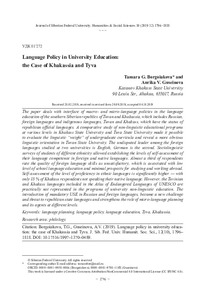Language Policy in University Education: the Case of Khakassia and Tyva
Скачать файл:
URI (для ссылок/цитирований):
https://elib.sfu-kras.ru/handle/2311/126879Автор:
Borgoiakova, Tamara G.
Guseinova, Aurika V.
Боргоякова, Т. Г.
Гусейнова, А. В.
Дата:
2019-10Журнал:
Журнал Сибирского федерального университета. Гуманитарные науки. Journal of Siberian Federal University. Humanities & Social Sciences;2019 12 (10)Аннотация:
The paper deals with interface of macro- and micro-language policies in the language education of the southern Siberian republics of Tuvan and Khakassia, which includes Russian, foreign languages and indigenous languages, Tuvan and Khakass, which have the status of republican official languages. A comparative study of non-linguistic educational programs at various levels in Khakass State University and Tuva State University made it possible to evaluate the linguistic “weight” of undergraduate curricula and reveal a more obvious linguistic orientation in Tuvan State University. The undisputed leader among the foreign languages studied at two universities is English, German is the second. Sociolinguistic surveys of students of different ethnicity allowed establishing the levels of self-assessment of their language competence in foreign and native languages. Almost a third of respondents rate the quality of foreign language skills as unsatisfactory, which is associated with low level of school language education and minimal prospects for studying and working abroad. Self-assessment of the level of proficiency in ethnic languages is significantly higher — with only 18 % of Khakass respondents not speaking their native language. However, the Tuvinian and Khakass languages included in the Atlas of Endangered Languages of UNESCO are practically not represented in the programs of university non-linguistic education. The introduction of mandatory USE in Russian and foreign languages, became a new challenge and threat to republican state languages and strengthens the role of micro-language planning and its agents at different levels В статье рассматриваются особенности макро- и микроязыковой политики в языковом образовании южносибирских республик Тыва и Хакасия, которое включает
русский, иностранные, а также языки коренных народов — тувинский и хакасский,
имеющие статус республиканских государственных языков. Сравнительное изучение
неязыковых образовательных программ различного уровня в Хакасском государственном университете и Тувинском государственном университете позволило оценить
лингвистический «вес» учебных программ бакалавриата и выявить более очевидную
лингвистическую направленность в Тувинском государственном университете. Безусловным лидером среди иностранных языков, изучаемых в двух университетах, является английский, на втором месте — немецкий. Социолингвистические опросы
студентов разной этнической принадлежности позволили установить уровни самооценки их языковой компетенции на иностранных и родных языках. Почти треть респондентов
оценивают качество владения иностранными языками как неудовлетворительное, что связано со слабой школьной языковой подготовкой и минимальными
перспективами учебы и трудоустройства за рубежом. Самооценка уровня владения
этническими языками существенно выше — только 18 % хакасских респондентов
не владеют родным языком. Однако тувинский и хакасский языки, включенные в Атлас
исчезающих языков ЮНЕСКО, практически не представлены в программах университетского нелингвистического образования. Введение обязательного ЕГЭ по русскому
и иностранным языкам оказывает негативное влияние на позиции республиканских
государственных языков, что усиливает роль языкового планирования и его субъектов
на микроуровне
Коллекции:
Метаданные:
Показать полную информациюСвязанные материалы
Показаны похожие ресурсы по названию, автору или тематике.
-
Ethnolinguistic Ecology of the Peoples of the North, Siberia and the Far East (On the Material of the Languages of the Northern Group of the Manchu-Tungus Languages)
Petrov, Alexander A.; Razumovskaya, Veronica A.; Петров, А. А.; Разумовская, В. А. (Сибирский федеральный университет. Siberian Federal University, 2019-08)The article is devoted to the problem of ethnolinguistic ecology of the indigenous peoples of the North, Siberia and the Far East — speakers of the northern group of the Manchu-Tungus languages of the Altai linguistic ... -
Ethnolinguistic Ecology of the Peoples of the North, Siberia and the Far East (On the Material of the Languages of the Northern Group of the Manchu-Tungus Languages)
Petrov, A. A.; Razumovskaya, V. A. (2019-08)The article is devoted to the problem of ethnolinguistic ecology of the indigenous peoples of the North, Siberia and the Far East — speakers of the northern group of the Manchu-Tungus languages of the Altai linguistic ... -
The Factors of British and American English Development under Globalisation
Melnichenko, Konstantin A.; Мельниченко, К.А. (Сибирский федеральный университет. Siberian Federal University., 2014-06)The paper studies the processes which arise during language contacts between the most influential varieties of the English language, British English and American English (BE and AE), and various autochthonous languages ... -
Этноязыковая ситуация Красноярского края в начале третьего тысячелетия
Фельде, О.В.; Felde, Olga V. (Сибирский федеральный университет. Siberian Federal University., 2011-07)This article presents the up-to-date view of ethno-linguistic situation in polylanguage and polycultural the Krasnoyarsk Territory. The functional typology of languages of this Siberian region has been given; historical ... -
Problems of Preserving the Kazakh Language in China: Threats of Extinction and Ways of Solution
Zharkynbekova, Sholpan K.; Tazhibayeva, Saule Zh.; Filchenko, Аndrey U.; Жаркынбекова, Ш. К.; Тажибаевa, С. Ж.; Фильченко, А. Ю. (Journal of Siberian Federal University. Сибирский федеральный университет, 2025-03)This article examines the Kazakh language spoken in China, focusing on its unique characteristics, historical development, and challenges in the context of globalization and sociolinguistic transformations. The study ...

